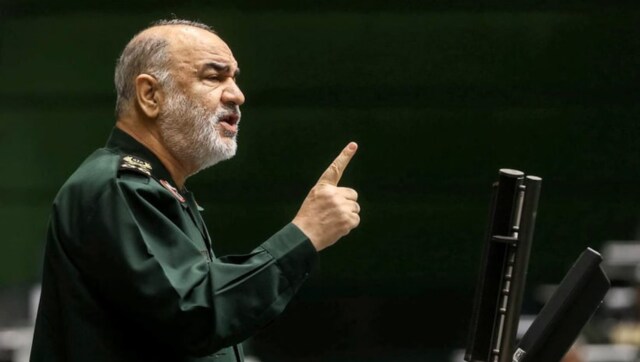
Maj Gen Hossein Salami. File Photo
In a recent development, Maj Gen Hossein Salami, the head of Iran’s Islamic Revolutionary Guards, has emphasised Iran’s lack of fear regarding potential conflict with the United States.
The statement comes as the Pentagon considers its response to the recent drone attack in Jordan that resulted in the deaths of three US military personnel.
Salami conveyed, “We do not leave any threat unanswered, and we do not seek war, but we are not afraid of it. This is the well-known truth.” The IRGC commander’s words reflect a stance of preparedness and resilience amid escalating tensions.
Following the drone attack, it is anticipated that other Iran-backed militias in Iraq may follow the lead of Kataib Hezbollah, the group responsible for the fatal incident, by suspending operations against US bases.
Kataib Hezbollah’s decision appears to be influenced by pressure from Iran to de-escalate the situation.
Amidst these developments, UK Defense Secretary Grant Shapps has flown to Washington for crisis talks, exploring options such as the potential deployment of a British aircraft carrier to the Red Sea.
This move could act as a substitute for the USS Dwight D Eisenhower, which is concluding its tour of duty.
Additionally, Houthi forces have continued firing missiles at US naval ships in the Red Sea, while Kataib Hezbollah declared a temporary suspension of attacks on American forces in the Middle East. The group emphasized its independent decision-making but suggested a potential coordination with other Iran-backed militias.
The statement from Kataib Hezbollah absolved Iran of responsibility for the drone strike, asserting that the Islamic Republic was unaware of the nature of their military operations. The group’s announcement may serve as a strategic move in information warfare, shaping perceptions of the escalating conflict.
As political pressure mounts, Iraq’s Prime Minister Mohammed Shia al-Sudani urges militias to cease attacks on US bases, potentially alleviating pressure on President Joe Biden to directly engage with Iran.
CIA Director William Burns attributes the conflict’s root cause to Iran, stating, “Key to Israel’s – and the region’s – security is dealing with Iran.” Burns highlights Iran’s emboldenment and readiness to support regional proxies amid expanding nuclear activities and enabling Russian aggression.
The US has pledged a “very consequential” response to the attacks, with indications that the groups responsible are backed by the IRGC and Hezbollah. Meanwhile, Yemen’s Houthi group vows to continue attacks on US and British warships in the Red Sea, raising concerns about potential disruptions to world trade.
Amidst the complexities, the UK explores cooperation with the US and potential deployment of aircraft carriers to the Red Sea. Simultaneously, a separate EU naval mission aims to protect shipping in the Red Sea, with discussions about command responsibilities ongoing among EU defense ministers.
On a different front, UK Foreign Secretary David Cameron engages in talks in Saudi Arabia, focusing on securing a humanitarian pause in Gaza and the release of hostages.
Talks also revolve around revitalizing the Palestinian Authority and addressing Houthi attacks on shipping. Cameron’s suggestion of recognizing Palestine before the end of peace talks adds a layer of diplomatic intrigue to the situation.

 3 months ago
72
3 months ago
72




 English (US)
English (US)